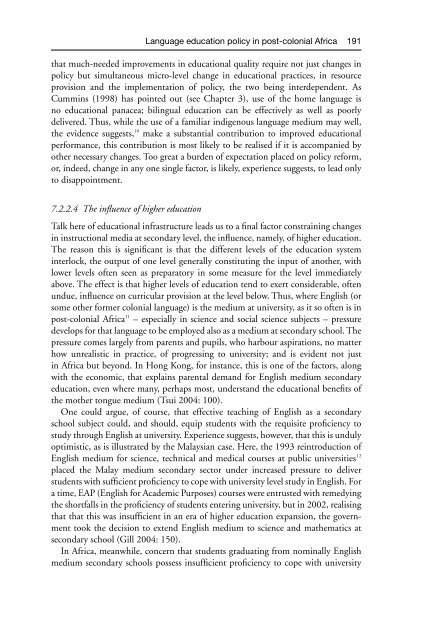Gibson Ferguson Language Planning and Education Edinburgh ...
Gibson Ferguson Language Planning and Education Edinburgh ...
Gibson Ferguson Language Planning and Education Edinburgh ...
You also want an ePaper? Increase the reach of your titles
YUMPU automatically turns print PDFs into web optimized ePapers that Google loves.
<strong>Language</strong> education policy in post-colonial Africa 191<br />
that much-needed improvements in educational quality require not just changes in<br />
policy but simultaneous micro-level change in educational practices, in resource<br />
provision <strong>and</strong> the implementation of policy, the two being interdependent. As<br />
Cummins (1998) has pointed out (see Chapter 3), use of the home language is<br />
no educational panacea; bilingual education can be effectively as well as poorly<br />
delivered. Thus, while the use of a familiar indigenous language medium may well,<br />
the evidence suggests, 10 make a substantial contribution to improved educational<br />
performance, this contribution is most likely to be realised if it is accompanied by<br />
other necessary changes. Too great a burden of expectation placed on policy reform,<br />
or, indeed, change in any one single factor, is likely, experience suggests, to lead only<br />
to disappointment.<br />
7.2.2.4 The influence of higher education<br />
Talk here of educational infrastructure leads us to a final factor constraining changes<br />
in instructional media at secondary level, the influence, namely, of higher education.<br />
The reason this is significant is that the different levels of the education system<br />
interlock, the output of one level generally constituting the input of another, with<br />
lower levels often seen as preparatory in some measure for the level immediately<br />
above. The effect is that higher levels of education tend to exert considerable, often<br />
undue, influence on curricular provision at the level below. Thus, where English (or<br />
some other former colonial language) is the medium at university, as it so often is in<br />
post-colonial Africa11 – especially in science <strong>and</strong> social science subjects – pressure<br />
develops for that language to be employed also as a medium at secondary school. The<br />
pressure comes largely from parents <strong>and</strong> pupils, who harbour aspirations, no matter<br />
how unrealistic in practice, of progressing to university; <strong>and</strong> is evident not just<br />
in Africa but beyond. In Hong Kong, for instance, this is one of the factors, along<br />
with the economic, that explains parental dem<strong>and</strong> for English medium secondary<br />
education, even where many, perhaps most, underst<strong>and</strong> the educational benefits of<br />
the mother tongue medium (Tsui 2004: 100).<br />
One could argue, of course, that effective teaching of English as a secondary<br />
school subject could, <strong>and</strong> should, equip students with the requisite proficiency to<br />
study through English at university. Experience suggests, however, that this is unduly<br />
optimistic, as is illustrated by the Malaysian case. Here, the 1993 reintroduction of<br />
English medium for science, technical <strong>and</strong> medical courses at public universities12 placed the Malay medium secondary sector under increased pressure to deliver<br />
students with sufficient proficiency to cope with university level study in English. For<br />
a time, EAP (English for Academic Purposes) courses were entrusted with remedying<br />
the shortfalls in the proficiency of students entering university, but in 2002, realising<br />
that that this was insufficient in an era of higher education expansion, the government<br />
took the decision to extend English medium to science <strong>and</strong> mathematics at<br />
secondary school (Gill 2004: 150).<br />
In Africa, meanwhile, concern that students graduating from nominally English<br />
medium secondary schools possess insufficient proficiency to cope with university






